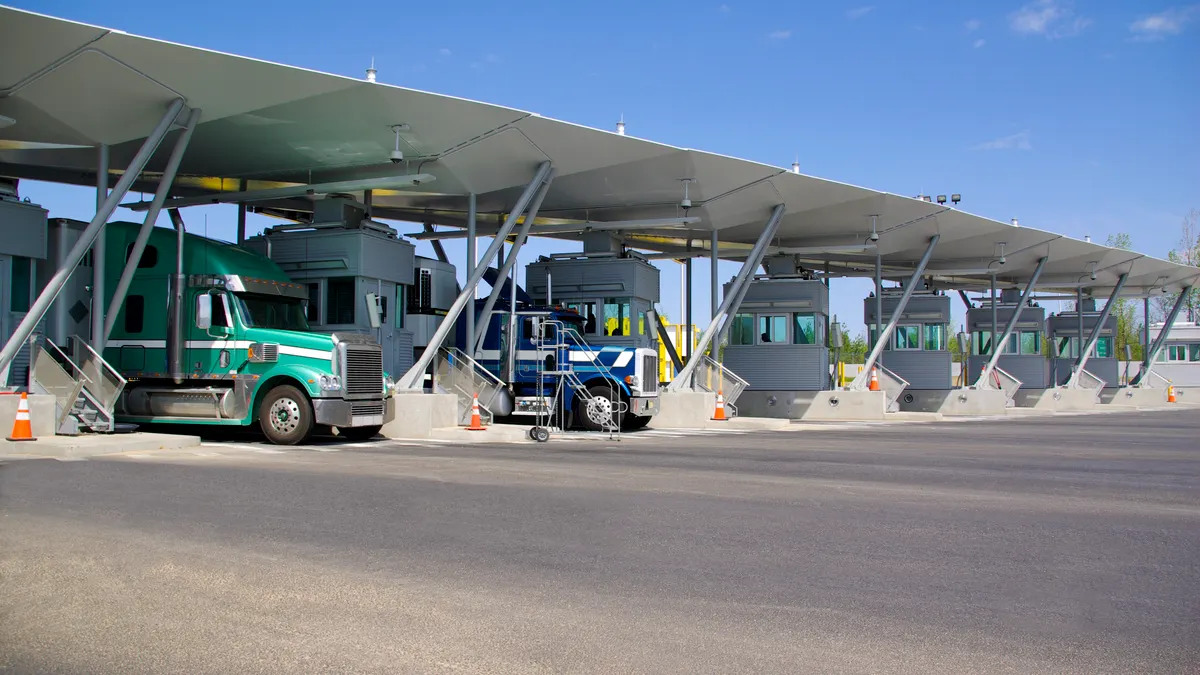Dive Brief:
- Essential goods were 61% of Knight-Swift Transportation's customer mix before the pandemic, but that share jumped to 72% by early April, company officials said in a Wednesday earnings release for Q1 2020. The company reported it was able to shift capacity from retailers and other non-essential good providers to support customers shipping essential goods. Knight-Swift said multiple brands and a diverse customer portfolio provided flexibility in its network.
- While revenue in Q1 dropped 6.6% to $1.12 billion, the company saw deadheading improve from last year, to 12.8% of miles, down from 12.9% in Q1 2019. Knight-Swift's operating ratio improved from 86.7% to 86.5%.
- Knight-Swift's net income dropped 25.6% year over year to $65.4 million, but the company reported no major layoffs. It has $622 million in available liquidity, with $119 million in cash on hand. "We do not foresee material liquidity constraints or any issues with our ongoing ability to meet our debt covenants," the company said.
Dive Insight:
Few earnings presentations will demonstrate how much the demand for food, paper products and medicines shot up through the Q1 pandemic spread, while shipments of industrial products and other non-essential items stalled by the end of March. But Knight-Swift acknowledged some customers had significant changes in business volume.
Declines balanced out with shipments of essential goods, for which share of Knight-Swift business went up 11 percentage points. Non-essential goods — the company did not specify what types of goods these were — were 39% of Knight-Swift's mix before the pandemic. By early April, the company said non-essential goods had shrunk to 28% of Knight-Swift's shipments.
It's unclear if essential goods are the tide that will lift trucking during the pandemic, because food, paper products and other items are only so much of the freight market. By mid-April, industry insiders were beginning to warn of a "freight cliff," as groceries began to restock. On April 21, Commercial Carrier Journal published a survey of carriers, with one anonymous official of a 50-truck carrier saying, "the grocery restock has been fulfilled and due to the stay at home rules, shippers that do not produce relief supplies are closed. Not enough freight to go around now, thus lower rates."
"Not enough freight" is also evident through dropping volumes at U.S. seaports, resulting from COVID-19's impact on Chinese suppliers and work to keep port workers safe from the outbreak. Knight-Swift's intermodal segment saw an 18.2% reduction in revenue, with a 13.2% reduction in load counts.
Knight-Swift says it expects nationwide trucking capacity to decrease in 2020. That could benefit Knight-Swift, as it's one of the largest truck firms in the U.S. But, due to COVID-19, the company suspended annual guidance for 2020. Knight-Swift said it could reintroduce guidance later in the year, if circumstances warrant. The company said it expects capital expenditures between $515 million and $540 million.
Regarding what it was seeing in April, the company made some observations in its online presentation, and the coronavirus effect could be seen in much of the analysis: load volumes were trending downward, "in the mid-to-high single digits." Along with volume, revenue per loaded mile and miles per tractor were also going down. The company also noted the soft market for used equipment market, not surprising as fleets make do with what they have, for now.
As with many carriers, Knight-Swift reported extra financial steps it took to ensure the safety of workers and the reliability of its operations, spending $2.3 million in Q1 to maintain the working environment for truckers and terminal employees. Knight-Swift said it expects to incur similar expenses in Q2.











